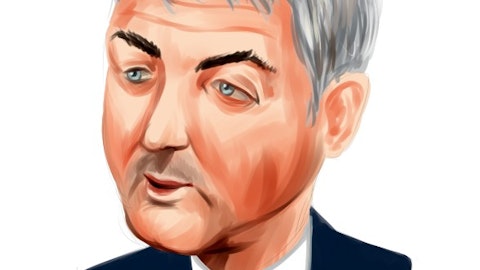
Hedge fund manager John Paulson, who had roughly 4.4% of his Paulson & Co portfolio invested in Hartford at the end of the fourth quarter – a position equal to 8.5% – demanded drastic actin. The fund manager also had some suggestions. In early March 2012, he began to lead a campaign to turn things around for the company and preserve shareholder value. Paulson suggested that the Hartford should spinoff its property and casualty (P&C) insurance business, but the insurance company had other plans. On March 21, the Hartford announced that it would stop selling variable annuities – a retirement savings product it helped revolutionize. Hartford CEO Liam McGee has said that the initiate will free the company to focus more on its property and casualty insurance, employee benefits and mutual funds. McGee had this to say in an interview shortly after the announcement was made: “We began a process in the middle of last year…looking at our portfolio of businesses and our business strategy. We’ve said we would be objective and pragmatic about what steps we would take to realize that goal. In the process of that evaluation, Paulson & Co. did make a suggestion of a split. We’ve been very open and transparent publicly about our open-mindedness and our objectivity and our rigorousness of looking at that. We just didn’t believe it was going to create shareholder value.”
“I think it’s important to note that when we looked at our businesses…We looked at each of those businesses and said the go-forward businesses for the Hartford really had to satisfy three criteria: they had to have a competitive market position against which we believed we can invest to create future profitable growth, the businesses had to be strong generators of capital, not consumers of capital; and finally, that the go-forward portfolio of business at the Hartford would over time create a company that had lower sensitivity to capital markets than the company does today.”
“Out of that comes a company that, in our view, over time will create higher ROEs. The ongoing businesses for the Hartford have a target 12%-13% ROE for 2012 alone. Our goal obviously is to increase that organically. These businesses represent virtually all the existing statutory earnings of the company.”
Of Paulson’s suggestion of a spinoff, McGee explained, “In our view the spin doesn’t make sense for shareholders at the current time.”He said that the businesses the Hartford is looking to sell “are businesses that, in general, are capital consumptive. In general, they do not have the target ROEs that we want, and their sale will create proceeds…that will create greater financial flexibility for the firm. We can use that flexibility in a number of ways…We can use it for capital management actions. We could use it to partially reduce some of our legacy annuity risks if it was economic at that time. We could use it to invest in our business or even reduce debt. It gives us a tremendous amount of flexibility.”
Paulson was not impressed.
“We support today’s actions, not as a conclusion of the strategic review, but as a first step in creating a clear delineation between The Hartford’s P&C and non-P&C businesses,” said Paulson & Co. “While we appreciate the extensive work of The Hartford’s board and management, we do not believe the positive actions announced today address the main problem with The Hartford’s undervaluation.” The firm explained that the main problem Hartford is facing is a “lack of interest from P&C analysts and P&C investors in Hartford’s best-in-class P&C business due to its affiliation with unrelated, low-return and complex businesses.” Paulson & Co. concluded by saying, “We do not believe today’s actions will materially increase P&C investor interest in The Hartford.”
I have to agree with Paulson on this one. A company is only worth as much as someone is willing to pay for it.
Paulson is saying that no one wants to invest in Hartford’s P&C business because the company is affiliated with other business that lacks the higher returns seen in P&C. McGee’s reaction is to sell those higher capital businesses and keep the P&C business close but Paulson’s suggestion to spin the business off makes much more sense. It would send the message to analysts and investors that the Hartford is serious about developing this aspect of its business.




